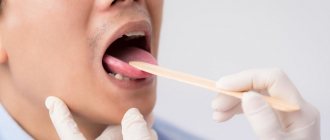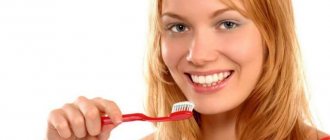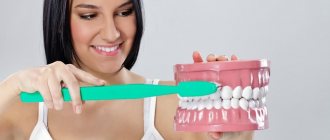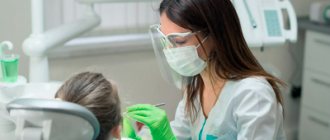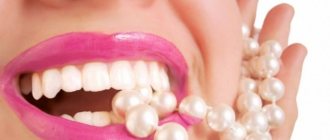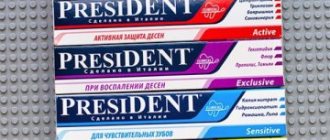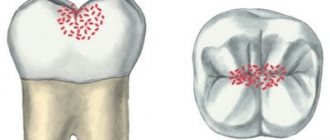Find out more
The need to maintain hygiene
More than 15 thousand bacteria and microbes live in the mouth. By feeding on food particles, they secrete acids that corrode tooth enamel. If you do not follow a set of hygienic measures, a carious cavity will form.
Oral hygiene includes disinfecting measures aimed at removing dental plaque. Maintaining these steps is an important step in preventing dental disease.
By following the rules of cleanliness you can achieve:
- fresh breath;
- healthy enamel color;
- destruction of pathogenic microflora;
- high quality teeth;
- prevention of caries, gum disease and periodontal disease.
Every person needs increased oral care, especially smokers and people with weak immune systems.
Eat healthy foods
“We are what we eat,” this proverb is true not only for dietetics, but also for dentistry. After all, tooth tissue is formed from the microelements that we consume in food. If you eat only “refined food,” then very soon the thickness and strength of the enamel will decrease, and soon the teeth will begin to decay.
One of the foods that are good for teeth is cheese. Just 5-10 grams of cheese, which you eat during a meal, will eliminate the acidic product of plaque, having an alkaline reaction. Edam, Gouda, Morbier, and Emmental cheese have the most calcium, which is also known to be very good for bones and teeth.
If you can't imagine life without sweets, choose chocolate. Preferably bitter. Solid chocolate will be less harmful to your smile than caramel or toffee. Chocolate is easy to wash off, while iris is very difficult to even clean with a toothbrush.
Another useful product for dental health is cocoa. The fact is that this overseas product has a pronounced anti-inflammatory effect, which is important for the gums and tooth surface. Cocoa inhibits the activity of collagenase, a harmful enzyme.
Types of hygiene
Measures to maintain the microflora of the oral cavity are divided into 2 types:
- Personal hygiene.
This is the basis for maintaining healthy teeth, preventing gum inflammation, caries and enamel destruction. High-quality and effective personal hygiene is not only about brushing your teeth. And it is advisable to know the basic measures to maintain “order” in the mouth from childhood.
- Professional cleaning.
It is performed by a dentist in a medical office.
It is important to note that these points do not exclude, but complement each other. It is necessary to undergo a preventive examination (2 times a year), observe the rules of personal hygiene and periodically resort to deep cleaning. All this will help prevent oral diseases and maintain the attractiveness of your smile.
Brush your teeth for at least 2-3 minutes
Research has shown that most of us spend less than 30 seconds brushing our teeth! Also, a significant proportion skip the procedure, getting by with just one treatment in the morning or evening. Take your time! Let brushing your teeth become not a necessity, but a pleasant procedure. It's easy to do:
- choose a suitable toothbrush,
- choose a toothpaste that tastes good,
- turn on the music
- think about the cleanliness of your teeth - keep track of all places,
- Make it a habit to brush your teeth every time you shower or after.
Feature of carrying out independent hygiene procedures
A full range of hygiene procedures includes:
- Using a toothbrush.
They are traditional (manual), electric and ultrasonic. It is believed that an electric brush is more effective in combating deposits and removing plaque. Many people are concerned about the issue of gum trauma. However, if the replacement head fits tightly on the brush and there are no chips on its body, it will not cause harm to your teeth and gums. In any case, in order for the cleaning process with any type of brush to be of high quality, it is important to devote at least 2-3 minutes to it.
- Using toothpaste.
Rospotrebnadzor identifies 4 types of the most effective pastes:
- Fluorine-containing. Reduces the risk of developing caries and demineralization of enamel.
- Whitening;
- Desensitizing. Reduces tooth sensitivity;
- With triclosan. They have an anti-inflammatory effect. It is desirable that the paste does not contain sodium lauryl sulfate, sodium cocosulfate, fluorine, or titanium dioxide.
- Using brushes and dental floss.
They remove food debris stuck in the interdental space.
- Use of rinses.
Essentially, these are antiseptic solutions that reduce the number of microbes in the mouth and also eliminate unpleasant odors.
- Using an irrigator.
This is a device that uses water to help clean teeth from food debris. The percentage of oral cavity cleansing is 99%. An irrigator is an intermediate step between home and professional cleaning. But if you want to spend as little money as possible on a dentist and enjoy your dental health as much as possible, then you can’t do without it.
How to choose a brush
You need to choose your toothbrush wisely. It should not be beautiful or from a popular manufacturer, but suitable for your oral cavity. Determine the most optimal stiffness, size, location of the bristles. A large brush will not speed up the process of brushing your teeth, while a small one will allow you to go through the most inconspicuous areas of the oral cavity.
Dentists recommend choosing nylon toothbrushes of medium hardness, because they are enough to remove plaque and at the same time they harm the enamel. It is better to choose ones with rounded ends so as not to injure your gums during care.
Another research-based tip is to hold your toothbrush like a ballpoint pen. According to scientists from Finland, their research has shown that in this way care is as thorough as possible, and it is almost impossible to harm soft tissues. It is absolutely wrong to hold the brush like a tennis racket - this is a direct way to harm your gums.
Now in stores you can find brushes that, in addition to traditional bristles, have rubber inserts. As practice has shown, this is not just a marketing technique to increase sales - soft rubber inserts work like an eraser. However, it is recommended to use it no more than several times a week. They are definitely recommended for active smokers, as well as black coffee lovers.
Another type of toothbrush is massagers. In them, rubber tabs are located on the sides and are used to improve blood circulation in the gums. This is an additional prevention of periodontal diseases. These brushes are not for regular use, but it is still recommended to have them at your disposal.
Professional cleaning
Since it is impossible to provide proper protection of the oral cavity from caries and other more serious diseases at home, dentists insist on visiting professional cleaning at least twice a year. The main advantages of this procedure:
- reduction of pathogenic microflora;
- increasing local immunity;
- removal of dental plaque.
Professional cleaning includes several stages:
- Removing soft plaque using the Air Flow air-abrasive technique. The device precisely delivers a powerful water-air jet, saturated with small abrasive particles, onto the tooth surface. Thanks to this, the area of the periodontal canals is cleared of pigmented plaque.
- Ultrasonic cleaning. Has antibacterial and antimicrobial effects. Thanks to thin attachments, the ultrasonic method helps remove stone from the supragingival part of the tooth, from under the gum and from the gingival canals.
- Polishing enamel with special pastes. To prevent plaque from sticking to the teeth, their surface should be as smooth as possible. Phyto-extracts have a mild whitening effect and also help strengthen the enamel.
- Strengthening fluoride therapy. This stage is not mandatory, but is carried out at the request of the patient. Disposable mouth guards are filled with a special remineralizing gel and placed on the upper and lower jaw. The gel lasts until it forms a thin protective film and is then washed off with water.
“Even with high-quality personal hygiene (and not everyone can boast of it) and cleansing of soft plaque, hard plaque (tartar) forms. This is due to both food debris and the mineral composition of saliva. Dental plaque contains a huge number of bacteria that cause and maintain inflammation in the periodontal tissues (tissues surrounding the tooth). Constantly inflamed gums cause bad breath, bleeding, and the saddest consequence is the destruction (loss) of bone tissue around the tooth. This disease is called periodontitis or periodontal disease, and it is what leads to tooth loss. With age, the rate of formation of hard plaque increases, and the risk of remaining without teeth increases. Regular professional hygiene allows you to promptly remove hard plaque and, therefore, protects teeth from falling out.”
Sergey Andreev
Candidate of Medical Sciences, dentist-therapist, orthopedic dentist, pediatric dentist
Lifehack for the toilet
The process of urination and defecation is something that causes both aesthetic and psychological discomfort. You can often encounter resistance from the patient and refusal to care, especially if everything happens deliberately. There are diapers on sale that provide relief, but they do not always maintain the amount of fluid or the results of bowel movements, as manufacturers claim. Therefore, it is necessary to teach the bedridden person to cope with the difficulty that has arisen. To make the procedure less unpleasant, you can significantly facilitate the entire process of defecation. To do this you need:
Immediately before defecation, a garbage bag is pulled over the vessel. The patient can defecate without worrying about the result; everything will remain in the bag, which is then simply thrown away. The consequences of the procedure are removed with wet wipes. The boat will remain clean and the result will be in the trash bag. Men find it easier to urinate into a dairy bottle. It's much more difficult for women. You can also use a trash bag and a bedpan.
This procedure is suitable for those who can control the process. For those who are not able to do this on their own, only a diaper is suitable. When putting it on, don't forget to protect your skin. While in a hygiene product, the skin is influenced by a certain “greenhouse effect”. It is imperative to use a cream with protective functions, which will create a barrier and prevent bedsores from developing. After each toilet, all excess must be removed. One of the hygienic options that has proven itself as a means of combating diaper rash and bedsores is depilation. The less hair there is, the easier it is to care for your skin.
Such simple and affordable tools do not require large material costs. Constant care is important, and if problems arise, timely treatment is started. In any case, the doctor will always prompt and give advice on how best to care for a bedridden patient.
Oral Care Tips
We have collected the top 5 tips from dentists that must be followed to keep your teeth beautiful and healthy.
- Don't go to bed with unclean teeth. Otherwise, the microbes will secrete lactic acid, which causes caries.
- Learn proper teeth brushing techniques. For example, clean them with smooth circular movements without strong pressure, hold the brush at an angle of 45 degrees, treat not only the outer, but also the inner and chewing surfaces of the teeth.
- Clean your tongue at the end of each brushing of your teeth, as plaque, consisting of dead mucous cells, food particles and microorganisms, is regularly deposited on it.
- Eat more fruits and vegetables. Plant foods contain dietary fiber that helps remove plaque from your teeth and tongue. In addition, fruits are excellent sources of vitamins to maintain oral health.
- Limit your consumption of starchy and sweet foods. The fast carbohydrates they contain stimulate the growth of cariogenic bacteria.
Use dental floss
Using dental floss (called floss), you can clean the spaces between your teeth.
But wooden toothpicks can only be used in “emergency cases” when there are no other ways to care for your teeth: at work, in a cafe, on the street. The point is not that it is difficult to thoroughly clean the spaces between teeth with their help; they can leave “splinters” and damage the soft tissue of the gums.
The floss cleans the spaces between the teeth more accurately, while also acting more effectively. If you don’t have a special thread at hand, you can get by with a regular one - about 45 centimeters of strong thread is enough, which can be wound around your finger. But it is better to use special dental floss to clean your teeth.
What happens if you don't maintain hygiene?
If you neglect the process of oral hygiene care, it can ultimately lead to many unpleasant consequences. Among them:
- Caries;
- Gingivitis (gum inflammation);
- Candidiasis (infection caused by bacteria of the genus Candida. Manifests itself in the form of a yellowish and grayish coating);
- Periodontitis. This is an inflammatory disease of the gums, characterized by tissue atrophy;
- Stomatitis (inflammation of the oral mucosa).
Free webinars on anti-aging medicine Learn about the features of the Anti-Age Expert International School, as well as the opportunities for improving your medical practice every day. The webinar program also includes fascinating reviews of innovations in anti-aging medicine and analyzes of the most complex clinical cases with recommendations that really work
Find out more
List of necessary daily caring actions
The choice of complex and frequency of hygiene procedures depends on the condition of the seriously ill patient. It is very important to understand what actions the patient is able to perform independently, so as not to lose the skills that are still available. Every morning, the caregiver should:
- wake up the patient;
- help relieve natural need;
- wash the genitals, change the diaper if necessary;
- carry out hygiene procedures - toilet the eyes, nose, mouth, ears;
- wipe the armpits, areas under the breasts in women;
- comb hair;
- straighten the bed, pajamas;
- prevent bedsores;
- measure physiological indicators;
- feed the patient;
- help take medications;
- follow the doctor’s individual recommendations.
Careful hygienic care ensures the comfort and well-being of a bedridden patient.
In contact with
